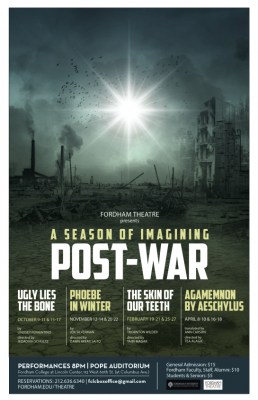Fordham Theatre Presents ‘A Season of Imagining Post-War’
August 28, 2014
Entitled “A Season of Imagining Post-War”, the 2014-2015 Fordham Theatre Mainstage season will explore what happens when the war is over. “The US has been at war since 1776 – there have been 21 years of peace, and 214 years of war. Apparently, we Americans are a warlike people – can’t live without war,” Matthew Maguire, theatre program director at Fordham College at Lincoln Center (FCLC), said when asked about the guiding theme for the season. Each of the four plays asks the audience several questions: Can we imagine the war ever being over and the new kinds of problems we will then face?

The four plays focus on the theme of family. “[The plays] are all about family: there are the characters that went to war, but also the characters that stayed behind too,” Jenny Slattery, associate director of theatre, said.
“There is the question of what does it mean to come home, and what does it do to a family. There is both the emotional pain and struggle for the ones who are coming home and for the people who stay. Each play shows this reaction in different ways, and each has different answers,” she said.
According to Slattery, the timeline of the plays are in reverse order. “[The Mainstage season] starts with a brand new, contemporary play, and ends with a play written all the way back in Ancient Greece. This comes to show that we have been struggling with the same issues of war forever,” Slattery said.
The first play to depict the aftermath of war is entitled “Ugly Lies the Bone”, which is written by Lindsey Ferrentino and directed by Jedadiah Schultz. Through the main protagonist and her sister, this play explores how the physical scars and burns from war not only affect the mental state of the war veteran, but also the people prevalent in their lives.
The second play in the mainstage season is entitled “Phoebe in Winter,” and is penned by Jen Silverman and directed by Dawn Akemi Satio. Taking place at the end of the war, the main protagonist’s entire family has been killed. She shows up at the home of the victors, and tells them that she will take over the identity for one of the bodies.
The third play, “The Skin of Our Teeth,” is written by Thornton Wilder and directed by Taibi Magar. A major part of the play focuses on a prevalent issue occurring in the US, when troops are returning home war and suffering from post-traumatic stress disorder.
“[The play] focuses on men returning home with an impulse from war, where it is okay to kill – what do they do with that impulse when they come back home,” Maguire said. “The men in the play were in an environment where they don’t have time to make a choice – their instinct has been honed to making snap judgments to kill.”
The last play of the season will be the classic Aeschylus’ “Agamemnon,” which is translated by Ann Carson and directed by Tea Alagic. In its modern transition, this classic play explores how issues triggering a war still fester, even when the physical fighting of war is over.
According to Maguire, the goal of the Mainstage season is to raise awareness, for both the audience and the actors. “The theatre is an important place for make meaning.
It is important that everyone that comes to the theater watches and engages in the dialogue of each of these play,” he said. “[The plays] are also a way of showing the artists we are training that they have a significant place in the culture.”









